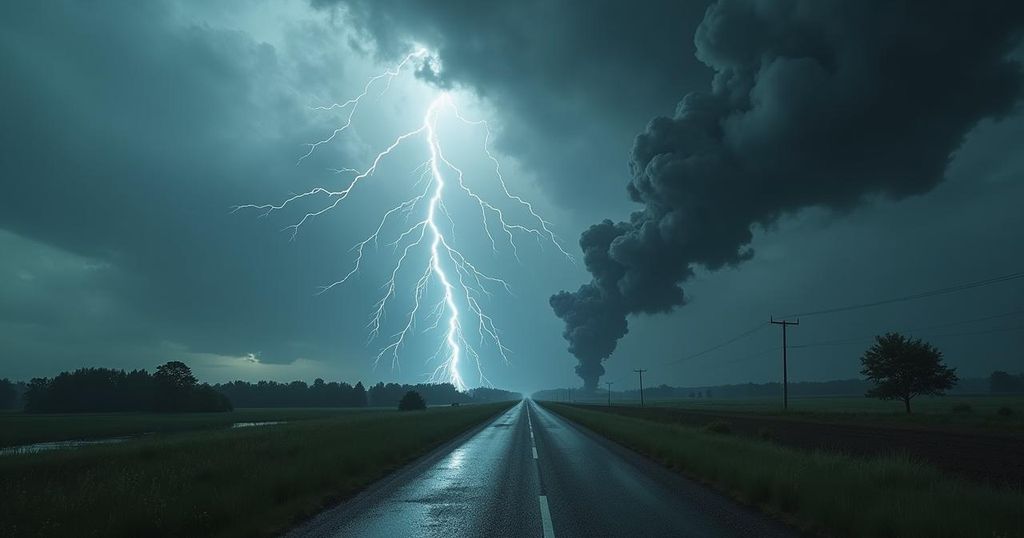Recent hurricanes have underscored the criticality of climate change as a national security threat, surpassing traditional dangers like terrorism. The Pentagon acknowledges this pressing issue, while historical frameworks for national security are scrutinized for their narrow focus. Calls for a broader definition are made, emphasizing the need to protect citizens from the extensive ramifications of climate change and potential pandemics, suggesting a reevaluation of security measures is crucial.
The recent devastation caused by Hurricanes Milton and Helene has crystallized the notion that climate change presents an urgent national security challenge far surpassing traditional threats such as terrorism or authoritarian regimes. Hurricane Milton has wreaked havoc across Florida, with climate experts asserting that the increased intensity of such storms is attributable to rapidly rising ocean temperatures. Merely two weeks prior, Hurricane Helene inflicted significant damage upon regions like Asheville, North Carolina—an area historically perceived as less vulnerable—resulting in the tragic loss of at least 232 lives. The perspective that climate change should be addressed as a national security crisis is one grounded in pragmatic realism rather than ideological liberalism. The Pentagon itself has acknowledged this, elevating climate change on its list of essential threats to national security. In a pointed statement, U.S. Secretary of Defense Lloyd Austin declared, “We face all kinds of threats in our line of work, but few of them truly deserve to be called existential. The climate crisis does.” Key naval installations, notably in low-lying areas like Norfolk and Virginia Beach, are increasingly at risk from rising sea levels caused by climate change, prompting military officials to implement measures to mitigate these threats. Additionally, the phenomenon of climate migration is inducing instability in various regions, as exemplified by the ongoing conflict in Sudan, which has become one of the deadliest conflicts globally. Historically, President Franklin Delano Roosevelt articulated a broader conception of national security than is prevalent today. As noted in Peter Roady’s work, “The Contest Over National Security,” Roosevelt viewed national security as encompassing the wellbeing of all American citizens, which influenced the establishment of Social Security—a program designed to safeguard Americans rather than provide mere welfare. In his 1941 State of the Union address, Roosevelt emphasized the need for “freedom from want,” an understanding that extends to ensure a healthy quality of life for every global citizen. The Cold War era shifted the focus of national security to a more narrow definition, fixating on defense against direct threats. This paradigm further solidified following the September 11 attacks, as articulated by the George W. Bush administration’s 2002 national security strategy, which promised that “Defending our Nation against its enemies is the first and fundamental commitment of the Federal Government.” This calls for a reevaluation of the national security framework, wherein climate change is not the sole existential threat. The ongoing COVID-19 pandemic, which has claimed around 1.2 million American lives—equivalent to casualties from every war since the American Revolution—also warrants serious consideration related to national security planning. The COVID Crisis Group’s recent report highlighted significant unpreparedness for future pandemics exacerbated by global travel. The recent hurricanes may compel American policymakers to adopt proactive measures for mitigating climate risks, such as imposing restrictions on new construction in flood-prone areas. In light of Hurricane Milton’s aftermath, Americans should critically evaluate whether they are indeed safer from threats such as climate change and pandemics—if not, it is imperative to engage in a meaningful discourse regarding what constitutes genuine national security.
The article discusses the increasing recognition of climate change as a significant national security issue, particularly in light of recent catastrophic hurricanes. It elaborates on the implications of these storms on American lives and infrastructure, while highlighting the Pentagon’s acknowledgment of climate change threats. Historical perspectives on national security are presented, showcasing how definitions have evolved, particularly in relation to Roosevelt’s broader view juxtaposed with contemporary narrow interpretations. The narrative further underscores the interconnectedness of climate-related issues and emerging global instability solutions, calling for an urgent reassessment of national security priorities.
In summary, the alarming impacts of Hurricanes Milton and Helene have ushered in a vital conversation about the role of climate change within the framework of national security. This evolving perspective urges policymakers to redefine security concerns, widening the scope beyond traditional military threats to encompass environmental crises and health pandemics. A pragmatic approach is imperative for safeguarding American citizens from the multifaceted threats posed by climate change and global health emergencies, thereby fostering a more comprehensive and realistic understanding of national security.
Original Source: amp.cnn.com






